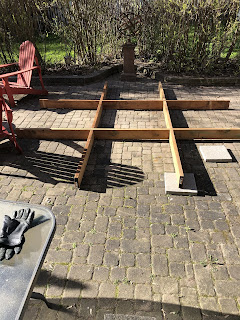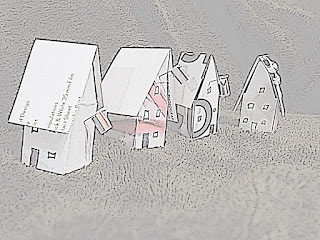A collection of Interpretative photos, educational resources, and thoughts about things. I acknowledge that I am a non-Indigenous Canadian living on the traditional lands of the Indigenous people who are the original stewards of this land. I hope to be guided by their respect for the land and I call on my society to respect the signed treaties between our nations.
Sunday, May 31, 2020
Saturday, May 30, 2020
Friday, May 22, 2020
Thursday, May 21, 2020
Tuesday, May 19, 2020
I’m a Settler and I’m not proud of it
Recently someone asked me about some of the labels I apply to myself because they didn’t necessarily agree that these labels being applied to them. I’m a non-Indigenous, settler Canadian, I present as a male, I’m white, I’m heterosexual, I’m university educated, and I’m well employed - these are a few of my labels.
When it comes to labels, we don’t have to be proud of them, but we do have to acknowledge when they apply to us; I’m actually ashamed of a good number of my labels at various times, but just because a person doesn't like a label doesn’t mean a person can deny the label if it applies.
For example, I present as a male and call myself a man. With this label comes many stereotypes and pre-existing expectations, that even if I don’t agree with, don’t stop me from being a man. There are many times when I’m ashamed of the label ‘man’ especially when I hear of men committing acts of sexual violence, when I hear of men being sexist in the workplace, and when I think of the harassment men perpetrate against women. This 'man' label is a label I must live with and because of my shame, it is one that I combat to try to bring new meaning to. I call out sexism when I see it, I report abusers when I hear of them, and I treat all women with respect as a role model for my child. I can’t deny the label ‘man’ but I can try to redefine it.
Another label I have is that of being a non-Indigenous settler. I am non-Indigenous; I’m of Scottish and German heritage being able to trace family in Canada back to the mid-1880s. I was born in Canada but that still doesn’t make me a member of the Indigenous People living in this territory called Canada. I’m not First Nations, nor Inuit, nor Métis. I’m a member of the European culture that has come to dominate society as the dominant culture.
So yes, I’m a settler. I’m not the settler that broke the treaty, I’m not the settler that voted for the government that enacted the Indian Act and developed Residential Schools, and I’m not the settler discriminating against Indigenous People today. But I am a settler. And it is not a label I am proud of.
Settlers are any people who came to Turtle Island from another country or their descendants. Settlers are people who stay here even when they realize that their existence here infringes on the way of life of the Indigenous People. I was born in Canada and I enjoy the lifestyle that came from the work and actions of the settlers that settled here - even if I’m ashamed of them.
Anyone in Canada who is non-Indigenous is a settler, whether you came here willingly or unwillingly or whether you were born here of first-generation or eighth generations immigrants, you are a settler. Settlers are people who stay in Canada even when they don’t agree with the way settlers exploited the Indigenous People to become the dominant culture. Dominant Canadian culture is the settler lifestyle. Canadian culture is Euro-centric. It is primarily Christian in that it still observes Christian holidays and operates under the Christian calendar. It is Euro-centric in that it believes in capitalism, mercantilism, democracy, colonialism, and resource depletion. Dominant Canadian culture is the culture of Canadians.
I owe it to society to acknowledge my labels and when the labels embarrass me, do the work to make society better. I fight racism against all people, and as a settler, I fight against racism against Indigenous People. I fight systemic racism against Indigenous People by adding my voice to their calls for justice. I fight the exploitation of our resources by adding my voice and actions to environmental causes and land stewardship as the Indigenous People practice. I can do everything possible to raise up Indigenous People but I am a settler. It’s a label I live with in shame every day. I acknowledge my labels but I don’t let them define me; I’m working to redefine them.
Monday, May 18, 2020
Interesting fact - it was common for pioneers to lose children in the vast forests on Ontario
I found this fact fascinating - something we don't think about these days:
"During the 18th and 19th centuries, getting lost was one of the most common causes of death among the children of European settlers in the North American wilderness. "Scarcely a summer passes over the colonists in Canada without losses of children from the families of settlers occurring in the vast forests of the backwoods," the Canadian writer Susanna Moodie noted in 1852."
from https://www.wired.com/story/why-humans-totally-freak-out-when-they-get-lost/?utm_medium=10today.media.20200518.436.2&utm_source=email&utm_content=article&utm_campaign=10-for-today---4.0-styling
"During the 18th and 19th centuries, getting lost was one of the most common causes of death among the children of European settlers in the North American wilderness. "Scarcely a summer passes over the colonists in Canada without losses of children from the families of settlers occurring in the vast forests of the backwoods," the Canadian writer Susanna Moodie noted in 1852."
from https://www.wired.com/story/why-humans-totally-freak-out-when-they-get-lost/?utm_medium=10today.media.20200518.436.2&utm_source=email&utm_content=article&utm_campaign=10-for-today---4.0-styling
Sunday, May 17, 2020
Saturday, May 16, 2020
I am not a body with a spirit...
.....but rather, as Richard Wagamese says, I am a spirit with a body.
I am a spirit briefly anchored to earth by a body like a blade of grass anchor by roots. I blow in the wind answering the call of the spirit wind until I am freed.
I am a spirit briefly anchored to earth by a body like a blade of grass anchor by roots. I blow in the wind answering the call of the spirit wind until I am freed.
Thursday, May 14, 2020
Two jokes
My supervisor at work shared these two jokes. Should I report them to HR for humour abuse?
1. Why didn't the teddy bear have dessert?
1. Why didn't the teddy bear have dessert?
Because he was stuffed.
2. Did you hear about the 2 guys who stole a calendar?
They each got 6 months.
Tuesday, May 12, 2020
Monday, May 11, 2020
Friday, May 8, 2020
Thursday, May 7, 2020
Saturday, May 2, 2020
Subscribe to:
Posts (Atom)





















